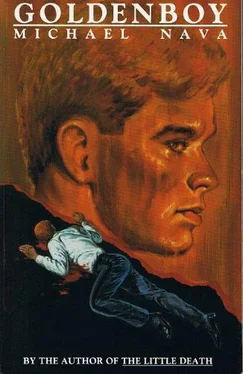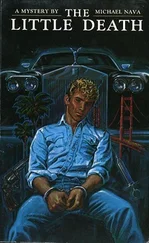Michael Nava - Goldenboy
Здесь есть возможность читать онлайн «Michael Nava - Goldenboy» весь текст электронной книги совершенно бесплатно (целиком полную версию без сокращений). В некоторых случаях можно слушать аудио, скачать через торрент в формате fb2 и присутствует краткое содержание. Жанр: Криминальный детектив, на английском языке. Описание произведения, (предисловие) а так же отзывы посетителей доступны на портале библиотеки ЛибКат.
- Название:Goldenboy
- Автор:
- Жанр:
- Год:неизвестен
- ISBN:нет данных
- Рейтинг книги:5 / 5. Голосов: 1
-
Избранное:Добавить в избранное
- Отзывы:
-
Ваша оценка:
- 100
- 1
- 2
- 3
- 4
- 5
Goldenboy: краткое содержание, описание и аннотация
Предлагаем к чтению аннотацию, описание, краткое содержание или предисловие (зависит от того, что написал сам автор книги «Goldenboy»). Если вы не нашли необходимую информацию о книге — напишите в комментариях, мы постараемся отыскать её.
Goldenboy — читать онлайн бесплатно полную книгу (весь текст) целиком
Ниже представлен текст книги, разбитый по страницам. Система сохранения места последней прочитанной страницы, позволяет с удобством читать онлайн бесплатно книгу «Goldenboy», без необходимости каждый раз заново искать на чём Вы остановились. Поставьте закладку, и сможете в любой момент перейти на страницу, на которой закончили чтение.
Интервал:
Закладка:
“What happened in court?” I asked her.
“I got three continuances and disposed of two other cases.
That frees you up for at least a couple of weeks. How are you?”
“Trial’s set in six weeks. My client wants a straight not guilty defense.”
“On the facts you told me?”
“That’s right.”
“The kid has a death wish.”
“Then he may get it,” I replied. “The D.A. wants to amend and add special circumstances.”
“That just occurred to him?” she asked, incredulously.
“He’s playing to the press,” I replied. “I don’t know how serious he actually is about amending.”
“Any chance the kid’s not guilty?”
“I asked the very same question of the P.D. who was handling the case. She rolled her eyes.”
“That must mean no,” Catherine said. “What are you going to do, Henry?”
“Larry Ross sees Jim as a victim of bigotry against gays,” I said. “That’s what he wants to put on trial.”
“I don’t see how that changes the evidence.”
“Agreed. But it might change the way the jury looks at the evidence.”
“I don’t know, Henry,” she said. “I think people are tired of being told they have to take the rap when someone else breaks the law.”
“Larry’s point is that in this society it’s easier to kill than to come out. That’s not so far-fetched.”
“Not if you’re gay,” she replied. “Most people aren’t.”
“Would you buy it, Catherine?”
“Yes,” she said after a moment’s pause. “And I’d still vote to convict.”
“You’re a hard-hearted woman,” I joked.
“That’s right,” she said seriously. “And I’m not even a bigot.”
We said our goodbyes and I sat at the desk in the study looking out the window to the lake below.
Sidney Townsend looked exactly like what I imagined someone named Sidney Townsend would look like. He concealed the shapelessness of his body in an expensive suit but his face was big, florid, and jowly. His hair was swept back against his head and held fixedly in place by hairspray. Small, incurious eyes assessed me as he smiled and shook my hand.
He led me into his office, a tastefully furnished room that was nearly as dark as a confessional. Perhaps he specialized in lapsed Catholics, I thought, or maybe the dimness was evocative of a bedroom in keeping with psychiatry’s obsession with sex. I sat down on a leather sofa while he got Jim’s file. He joined me, sitting a little too close and facing toward me, his jacket unbuttoned and his arm draped across the back of the sofa, leaning toward me. The perfect picture of candor. I drew back into my corner.
“So,” he said, “you’re taking Jim’s case to trial.”
“So it appears. Do you get many appointments from the court?”
“It’s probably a quarter of my practice,” he said. “Does that bother you?”
“I just like to know,” I said. “I wouldn’t want the D.A. to be able to call you a professional witness.”
“I have a whole response worked out for that,” he said with a confident smile.
I bet you do, I thought. Aloud I said, “I’d like to know something about Jim Pears.”
“Oh,” Townsend said, offhandedly, “a typical self-hating homosexual.”
“Typical?”
He shrugged. “I know that the A.P.A. doesn’t consider homosexuality to be a mental disease,” he said, “but let’s face it, Mr. Rios, many if not most homosexuals have terrible problems of self-esteem. I see a lot of instability among them.”
“You think being gay is a mental disorder per se?” I asked, keeping my voice neutral.
“That’s not what I said,” he replied tightly, then added, “You’re gay yourself, aren’t you?”
“Is that relevant?”
He smiled and shrugged. “To whether you retain me, probably.” He studied me. “I’m not the enemy, Mr. Rios.”
I looked back at him warily. “Okay, you’re not the enemy. Why don’t we talk about Jim.”
He picked up a folder and opened it. “Jim says he’s known about his homosexuality from the time he reached puberty,” Townsend said. “He’s had sexual relations with men for the last couple of years. Typical bathroom pickups, parks, that sort of thing. The incident in the restaurant was consistent with his pattern of sexual behavior.”
“Which incident?”
“The man he was discovered with,” Townsend said, “was a customer in the restaurant who picked him up and took him out to his car for sex. That’s where this other boy — Fox? — found them.”
“These sexual encounters sound risky,” I said.
“They are. Maximally so, but then, Jim wanted to get caught.”
“Is that what he says?”
“No, but it’s obvious, isn’t it?”
“What seems obvious to me,” I said, “is that the reason a gay teenage boy has sex in public places is because he has nowhere else to go.”
Townsend looked as if the thought had not occurred to him. “Possibly,” he said.
“I was told that Jim doesn’t remember anything about the actual killing,” I said.
“That’s right,” Townsend replied. “It’s a kind of amnesia induced by the trauma of the incident. It’s fairly common among people who were in serious accidents.”
“Not physiological at all?”
“He was given a medical examination,” Townsend said. “Nothing wrong there. It’s psychological.”
“Aren’t there ways to unlock his memory?” I asked.
“As a matter of fact,” Townsend said, “I tried hypnosis.”
“Did it work?”
“No. People have different susceptibilities,” he explained. He thought a bit. “There are drugs, of course. Truth serums. I doubt they would work, though. He’s really built a wall up there.”
“Are you treating him at all?”
“That’s not really my function, is it? My examination was entirely for forensic purposes.”
“What about his parents? Have you talked to them?”
“They wouldn’t talk to me. They’re strict Catholics who don’t trust psychiatry.”
“They’d rather believe their son is possessed by the devil,” I observed, bitterly.
“Which is simply an unschooled way of describing schizoid behavior,” Townsend explained.
“Who’s schizoid?”
“Jim, of course. He’s completely disassociated himself from his homosexuality.”
“Can you blame him?”
“I’ve given you my views on homosexuality,” Townsend replied tartly.
“No doubt you shared them with Jim as well.”
His small eyes narrowed. “I said I wasn’t the enemy.” “Because you’re not actually malicious?”
“Do you want me to testify or not?” he snapped.
“No, I don’t think so.”
He looked at me, then shrugged. “I still have to bill you for this time.”
“Sure.” I got up to leave.
“Mr. Rios,” he said, as I reached the door. “You’re making a mistake, you know. I’m the best there is.”
“So,” I said, “am I.”
6
The sheriffs brought Jim into the conference room and seated him across from me at a table divided by a low partition. The walls were painted a grimy pastel blue that made the room look like a soiled Easter egg. The lights were turned up to interrogation intensity and I got my first good look at Jim Pears.
His fingernails were bitten down to ragged stubs. His face was white to the point of transparency and a blue vein pounded at his temple as if trying to tear through the skin. Splotches of yellow stubble spotted his chin and cheek. His hair, unwashed and bad-smelling, was matted to his head. The whites of his eyes were streaked with red but the irises were vivid blue — the only part of his face that showed life.
His eyes were judging me. It was as if I was the last of a long line of grown-ups who would fail him. It annoyed me. His glance slipped away.
Читать дальшеИнтервал:
Закладка:
Похожие книги на «Goldenboy»
Представляем Вашему вниманию похожие книги на «Goldenboy» списком для выбора. Мы отобрали схожую по названию и смыслу литературу в надежде предоставить читателям больше вариантов отыскать новые, интересные, ещё непрочитанные произведения.
Обсуждение, отзывы о книге «Goldenboy» и просто собственные мнения читателей. Оставьте ваши комментарии, напишите, что Вы думаете о произведении, его смысле или главных героях. Укажите что конкретно понравилось, а что нет, и почему Вы так считаете.












